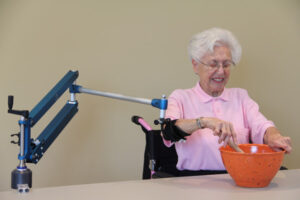SaeboMas – Dynamic Mobile Arm Support
 The SaeboMas is a dynamic mobile arm support system which can suspend the limb eliminating the forces of gravity and facilitate the correct alignment of the joints. This optimises an individual’s capability to participate in the therapeutic rehabilitative task and maximise their level of participation.
The SaeboMas is a dynamic mobile arm support system which can suspend the limb eliminating the forces of gravity and facilitate the correct alignment of the joints. This optimises an individual’s capability to participate in the therapeutic rehabilitative task and maximise their level of participation.
Why we use it
Individuals who have experienced a neurological event may experience weakness of the muscles in their arm/s. The diminished level of muscle activity puts a significant strain on the joints within the arm specifically the shoulder joint which relies on the surrounding musculature to keep the joint congruent. The affect of gravity upon the limb causes it to feel very heavy and increases the difficulty for the individual to recruit and strengthen the muscles during their rehabilitation.
Weakness of the arm can cause significant discomfort to the individual, use of the SaeboMas through de-weighting and optimising alignment of the shoulder joint, can reduce levels of pain or discomfort experienced. Thus enabling an individual to focus on the rehabilitative task and complete a high number of repetitions due to the absence of the most common limitations of pain or fatigue.
How it helps us
Unlike an arm sling which requires the individual to independently support the weight of their own arm with it positioned sub optimally across the body, the SaeboMas de-weights the limb and allows the limb to be positioned optimally in accordance to the rehabilitative task, taking the responsibility away from both the individual and the clinician. The clinician then has the assurance that the shoulder joint is well aligned and supported and the individual is able to focus on the task and maximise their level of participation.
